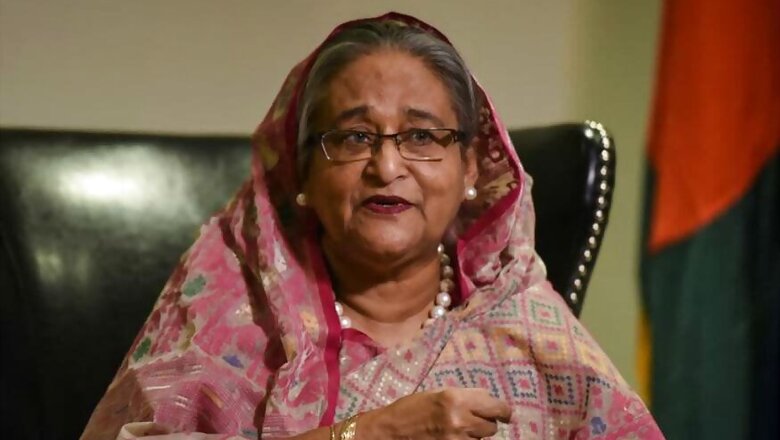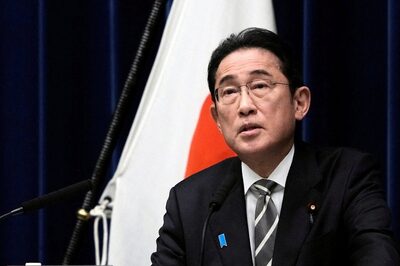
views
Kolkata: The 16 crore population of Bangladesh is set to witness its single-phase general election on December 30. This will be the country's 11th National Parliamentary Election.
The Jatiya Sangsad (House of the Nation) is the top unicameral law-making body of Bangladesh. It has a total of 350 members, out of which 300 are elected by voting in a first-past-the-post format in single-member constituencies. The remaining 50 seats are reserved for women and will be distributed on the basis of vote share of the contesting political parties.
This time the total number of parliamentary seats being contested is 299 because Gaibandha-3 race has been postponed following the death of a candidate.
More than 10 crore Bangladeshis are eligible to cast their votes in more than 40,000 polling stations across the country. Bangladesh Nationalist Party (BNP), the main opposition, is facing a challenge as its chief Khaleda Zia is ineligible to contest the polls because of her five-year jail term in two corruption cases.
On the other hand, Bangladesh Awami League (BAL) leader Sheikh Hasina is seeking to win a third consecutive term in office.
Political experts say that the country is yet to achieve a political and economic stability in last four decade because of the rivalry between the two main political parties – BNP, BAL and several military coups in past.
Speaking to News18 over telephone from Dhaka, Mirza Fakhrul Islam Alamgir, BNP’s General Secretary, said, “Bangladesh is passing through the worst phase ever since Sheikh Hasina became the Prime Minister in January 2009. The government has failed in all sectors. The garment manufacturing sector is the worst sufferer under Hasina’s autocratic rule.”
“We have doubt that there will be free and fair election because a large number of our mass leaders were arrested/detained recently to prevent them from contesting the elections/helping in the poll process. Out of the 300 contesting seats, we have fielded candidates in all the constituencies but the Election Commission (EC) barred 25 well known leaders from contesting. The EC is bias and working on behest of the ruling government,” he added.
“Khaleda Zia’s arrest and disqualifying her for contesting election due to her legal issues has nothing to do with her corruption charges but it was purely a political move. We want immediate release of Khaleda Zia. In 2014, Sheikh Hasina managed to form the government because we did not take part in the poll since our demand for an election-time caretaker government was not met. But this time, we are sure that people will support us,” Fakhrul said.
While Hasina is leading her party along with nearly 14 allies, including Jatiya Party of Hussain Muhammad Ershad under the banner of ‘Mahajot’, BNP is going to face its crucial fight (with nearly 23 allies) under the banner of ‘Jatiya Oikya Front’. ‘Jatiya Oikya Front’ is a conglomerate of rightist parties and presently it is headed by former foreign minister under Sheikh Mujibur Rahman, Dr Kamal Hossain.
Bangladesh has the fourth largest Muslim population in the world after India, Pakistan and Indonesia and during the election, Islamist parties also play an important role in the country’s politics.
Political history in Bangladesh witnessed how Hefazat-e-Islam extended its support to Awami League, while BNP maintained ties with Jamaat-e-Islami, a religious party accused of war crimes during the 1971 war of independence. The BNP maintained that it was not an ideological alliance, while Awami League always preferred to keep mum on this issue. “It’s a political compulsion. Even the ruling party is backed by some Islamist parties. This is nothing new in Bangladesh politics. In a democratic set up, everybody has an equal right to contest polls,” Fakhrul said.
Mahbub-ul-Alam Hanif, Joint General Secretary of the Bangladesh Awami League, while rubbishing all the allegations, said, “Bangladesh is passing through a golden phase under the leadership of Sheikh Hasina. It will be wrong to say that there was no financial growth and developmental under her leadership. The BNP leaders who are accusing the present government are corrupt and facing police cases for arson, rioting, terrorism and clashes. They don’t believe in the democratic process but in violence and have links with the terror groups. We are confident of full majority and of once again forming the government.”
He said, “We are world’s second-largest textile producer after China. The country has a 6.4 per cent share of the overall export of clothing to the US and the European Union with more than 2.5 million people working in this industries. The BNP doesn’t want development and growth of textile industries. The textile industry here is vulnerable to foreign competition and BNP is trying to create political unrest to affect country's economic output. People in Bangladesh will not let this happen and will reject the BNP.”




















Comments
0 comment